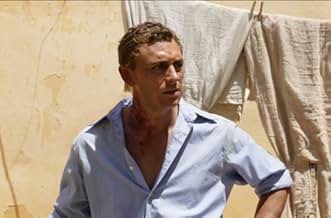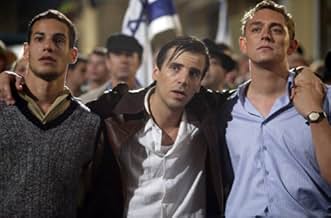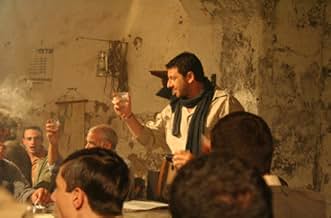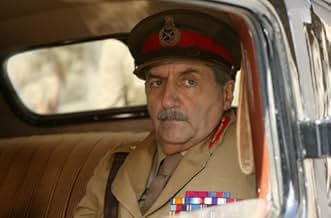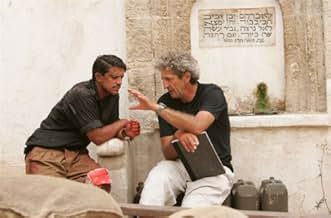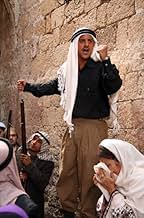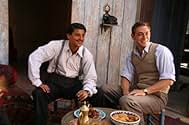Un cuento sobre la amistad entre dos hombres, uno judío y otro árabe, durante el nacimiento del estado de Israel.Un cuento sobre la amistad entre dos hombres, uno judío y otro árabe, durante el nacimiento del estado de Israel.Un cuento sobre la amistad entre dos hombres, uno judío y otro árabe, durante el nacimiento del estado de Israel.
- Dirección
- Guionistas
- Elenco
Mhairi Morrison
- Cathy
- (as Mhairi Steenbock)
- Dirección
- Guionistas
- Todo el elenco y el equipo
- Producción, taquilla y más en IMDbPro
Opiniones destacadas
O Jerusalem is certainly a good step in the right direction. It does not claim to be a historically pin-point accurate epic, but it does cover most of the salient events of that period in history.
I have personally known Abdelqader Al-Husseini, and Major later Colonel Abdallah Al-Tal. The first was the son of one of the top aristocratic families in Jerusalem, and the second hails from a large tribe in the area of Irbid in what is known today as Jordan. As the film shows, Husseini was let down by the Arab League and was killed in action during the Qastal operation. That corresponds to the facts. When Larry Collins and Dominique Lapierre wrote their book bearing the same name as the film, they interviewed Husseini's sons. One of whom was Faysal Husseini of Orient House fame, and who died of a heart attack a few years ago.
Major Tal's intervention during the fighting in Jerusalem was not sanctioned by the British Chief of Staff of the Arab Legion (i.e. the Jordanian Army), General Glubb Pasha, and only hesitantly if at all by King Abdullah. The latter was already pursuing secret negotiations with Golda Meir and Moshe Sharett about getting a piece of Palestine for himself (An act of high treason at that time, at least as far as the Palestinians were concerned). Major Tal's personal military initiative in Jerusalem secured the eastern part of the city for King Abdullah, but also for the Palestinians, until the 1967 Six Day war. But Abdullah became jealous because of Al-Tal's popularity and accused him of trying to seize power in Jordan in order to annex it to Syria (pretty disingenuous!) Al-Tal spent the next twenty years or so as a political refugee in Egypt. To check what Major Tal said during the encounter between him and the Haganah leaders (Moshe Dayan), interested individuals can read Dayan's and Al-Tal's memoirs (probably translated from Arabic by the IDF, and/or possibly by one of the Pentagon many agencies.
The film perpetuates a line that has been discredited by historians on all sides, namely purporting that the "Arab governments asked the Palestinians to abandon their homes and leave their country so that the Arab armies could fight the "Jews" with ease". Nobody did call, and nobody would have responded to such a call. But Egypt and Jordan took every possible measure to prevent the Palestinians from acquiring weapons, and non-Palestinian volunteers were not encouraged to participate in the fighting.
What is never clarified about the Palestinian-Israeli question, including by the Palestinians themselves, is that they did not rise against the Jewish Arab community that had lived among them for millenia, not even the few Europeans who had settled there during the Ottoman Empire. When, in the latter part of the 1920s and on, a new breed of mainly Eastern European Jewish immigrants escaping the horrors in Europe had started arriving into the country essentially with British help, and with the intent of creating a Jewish-only state; the only way for them to achieve that of course was by force. Nobody can fault anyone for resorting to force to oppose that predicament.
I saw the DVD only yesterday in French, though it was obvious that the actors were speaking English, and the French was dubbed over it. I am looking for an English version if such exists. As for the change of title from "Beyond Friendship", which was probably going to appear in English, it is quite possible, though I cannot swear to it, that pressure was put on the distributors to avoid marketing the film in the USA. But then many of the actors are French.
Some of the text titles translated into Arabic, and the name of a street or two in Jerusalem were not accurately translated or properly spelled in the film.
Elie Chouraqui may be related to the famous André Chouraqui, who translated the Qoran into French, i.e. they should have a good understanding of the Arabic language and culture.
All in all, the film could be a good discussion topic for both sides, to give events their proper names and historic dimensions in search for mutual accommodation. That is of course if they are willing and able to undertake this necessary exercise for the sake of their sanity, the future of their children and world peace. Otherwise they have no other choice! If you prefer, you may comment on my review in French.
I have personally known Abdelqader Al-Husseini, and Major later Colonel Abdallah Al-Tal. The first was the son of one of the top aristocratic families in Jerusalem, and the second hails from a large tribe in the area of Irbid in what is known today as Jordan. As the film shows, Husseini was let down by the Arab League and was killed in action during the Qastal operation. That corresponds to the facts. When Larry Collins and Dominique Lapierre wrote their book bearing the same name as the film, they interviewed Husseini's sons. One of whom was Faysal Husseini of Orient House fame, and who died of a heart attack a few years ago.
Major Tal's intervention during the fighting in Jerusalem was not sanctioned by the British Chief of Staff of the Arab Legion (i.e. the Jordanian Army), General Glubb Pasha, and only hesitantly if at all by King Abdullah. The latter was already pursuing secret negotiations with Golda Meir and Moshe Sharett about getting a piece of Palestine for himself (An act of high treason at that time, at least as far as the Palestinians were concerned). Major Tal's personal military initiative in Jerusalem secured the eastern part of the city for King Abdullah, but also for the Palestinians, until the 1967 Six Day war. But Abdullah became jealous because of Al-Tal's popularity and accused him of trying to seize power in Jordan in order to annex it to Syria (pretty disingenuous!) Al-Tal spent the next twenty years or so as a political refugee in Egypt. To check what Major Tal said during the encounter between him and the Haganah leaders (Moshe Dayan), interested individuals can read Dayan's and Al-Tal's memoirs (probably translated from Arabic by the IDF, and/or possibly by one of the Pentagon many agencies.
The film perpetuates a line that has been discredited by historians on all sides, namely purporting that the "Arab governments asked the Palestinians to abandon their homes and leave their country so that the Arab armies could fight the "Jews" with ease". Nobody did call, and nobody would have responded to such a call. But Egypt and Jordan took every possible measure to prevent the Palestinians from acquiring weapons, and non-Palestinian volunteers were not encouraged to participate in the fighting.
What is never clarified about the Palestinian-Israeli question, including by the Palestinians themselves, is that they did not rise against the Jewish Arab community that had lived among them for millenia, not even the few Europeans who had settled there during the Ottoman Empire. When, in the latter part of the 1920s and on, a new breed of mainly Eastern European Jewish immigrants escaping the horrors in Europe had started arriving into the country essentially with British help, and with the intent of creating a Jewish-only state; the only way for them to achieve that of course was by force. Nobody can fault anyone for resorting to force to oppose that predicament.
I saw the DVD only yesterday in French, though it was obvious that the actors were speaking English, and the French was dubbed over it. I am looking for an English version if such exists. As for the change of title from "Beyond Friendship", which was probably going to appear in English, it is quite possible, though I cannot swear to it, that pressure was put on the distributors to avoid marketing the film in the USA. But then many of the actors are French.
Some of the text titles translated into Arabic, and the name of a street or two in Jerusalem were not accurately translated or properly spelled in the film.
Elie Chouraqui may be related to the famous André Chouraqui, who translated the Qoran into French, i.e. they should have a good understanding of the Arabic language and culture.
All in all, the film could be a good discussion topic for both sides, to give events their proper names and historic dimensions in search for mutual accommodation. That is of course if they are willing and able to undertake this necessary exercise for the sake of their sanity, the future of their children and world peace. Otherwise they have no other choice! If you prefer, you may comment on my review in French.
Although the film describes historical events in a relatively balanced way, eventually tends to tip the balance on the Israeli side, like most movies that reach the western circuit. I guess that the producers coming from that side or afraid of failing in the US market, highly influenced by the Jewish lobby, is behind that.. Why French actors were involved in this project? At the end a story of friendship in a world in conflict but a more dispassionate and objective look is needed. That a successful best seller was the main source does not ensure that the script will match (this is the case). In light of current events, the somewhat romantic look in other movies (Exodus for example) is given on the emergence of the state of Israel, is at least anomalous. Some of it is on this film.
That, oh so poignant verse from Psalm 137 altogether sums my impressions of the film. By all means, I am kind with my assessment. This should have been a great film, provided, the Hollywood script writers followed the book's theme. Alas, they did not; what else is new under the sun!
Despite its potential, the film did not explore or enunciate enough two of its main themes: the futility of war and more important, man's continued penchant to inflict inhumanity on fellow man. Oh yes, Bobby Golden Boy Goldman, one of the film's major players does indeed state either or both of those strong tenets even boldly. However, he does so en passant. Moreover, his excellent points are nonetheless made moot as the director cuts to the chase and the next bloodied then quickly sanitized atrocious conflict scene time and again. And there were so many of these telegraphed, goofy scenes. So many in fact,that soon I lost count.
Not long after, quite frankly I lost any or all lingering interest to stick it out until the curtain fell. Thank God for that tender mercy. This low budget, grade 'B' production could not end soon enough.
Before I exit, I must say that the film's depiction of the British protector-ship of the former Palestine was well, pathetic. Yes, we got it; the Thin Red Line had already gone bald and lost all of its former glory by that point. However, to paint them redder, er, yellow and to make them appear more inept even treacherous to the Hebrew cause, is well taking many creative, film making liberties.
Sure, the Brits neglected their peace keeping role while there. Even General Barker voiced his 'haaarrumph' stilted opinion and attested to that very fact while protesting to the then backpedaling, fleeing British High Commissioner. Still, he did so in a not so poignant manner nor propitious moment. No matter. The film had already gone so far south that it was difficult for me to discern which way lay O Jerusalem let alone the true path to peace.
I believe, the director and producer, though in an odd way tried to make their best case (whatever that was, we will never know). To wit, they could have done better with the film's plot if they had invested more time in exploring that noble road map to peace theme. No doubt, that lofty goal was well within their grasp and cinematic scope. However, all too predictably they instead chose to either neglect it, cut it first pass, or simply cast it aside altogether, just the same.
Like the British, Hollywood just could not help themselves nor the script. At every turn the actors fumbled the football, or bungled the entire dialog until finally, together, the flimsy cast and entire film crew botched what should have been an otherwise beautiful, possibly even most edifying film.
Forget about it!
Sigh...
Despite its potential, the film did not explore or enunciate enough two of its main themes: the futility of war and more important, man's continued penchant to inflict inhumanity on fellow man. Oh yes, Bobby Golden Boy Goldman, one of the film's major players does indeed state either or both of those strong tenets even boldly. However, he does so en passant. Moreover, his excellent points are nonetheless made moot as the director cuts to the chase and the next bloodied then quickly sanitized atrocious conflict scene time and again. And there were so many of these telegraphed, goofy scenes. So many in fact,that soon I lost count.
Not long after, quite frankly I lost any or all lingering interest to stick it out until the curtain fell. Thank God for that tender mercy. This low budget, grade 'B' production could not end soon enough.
Before I exit, I must say that the film's depiction of the British protector-ship of the former Palestine was well, pathetic. Yes, we got it; the Thin Red Line had already gone bald and lost all of its former glory by that point. However, to paint them redder, er, yellow and to make them appear more inept even treacherous to the Hebrew cause, is well taking many creative, film making liberties.
Sure, the Brits neglected their peace keeping role while there. Even General Barker voiced his 'haaarrumph' stilted opinion and attested to that very fact while protesting to the then backpedaling, fleeing British High Commissioner. Still, he did so in a not so poignant manner nor propitious moment. No matter. The film had already gone so far south that it was difficult for me to discern which way lay O Jerusalem let alone the true path to peace.
I believe, the director and producer, though in an odd way tried to make their best case (whatever that was, we will never know). To wit, they could have done better with the film's plot if they had invested more time in exploring that noble road map to peace theme. No doubt, that lofty goal was well within their grasp and cinematic scope. However, all too predictably they instead chose to either neglect it, cut it first pass, or simply cast it aside altogether, just the same.
Like the British, Hollywood just could not help themselves nor the script. At every turn the actors fumbled the football, or bungled the entire dialog until finally, together, the flimsy cast and entire film crew botched what should have been an otherwise beautiful, possibly even most edifying film.
Forget about it!
Sigh...
The subject of this film is difficult, a friendship and a war that comes in between friends. I would have given it a 9 but the propaganda in the film brings it down big time. This is not a historical film but it appears that some key dates have been followed.
Why do I call it a propaganda film? Because, it shows good and bad on both sides but actually it subtly forces the viewer to sympathise with one side. This is the art of propaganda. Also called brainwashing which keeps happening again and again. It feels that we will see many more propaganda films in the future. Also, the Brits got the wrong end of the stick, which is almost funny.
The two main characters, Bobby and Said are very likable as they appear as very genuine blokes. Their friendship is a real pleasure to watch, shame it was used to cover up the real agenda.
Why do I call it a propaganda film? Because, it shows good and bad on both sides but actually it subtly forces the viewer to sympathise with one side. This is the art of propaganda. Also called brainwashing which keeps happening again and again. It feels that we will see many more propaganda films in the future. Also, the Brits got the wrong end of the stick, which is almost funny.
The two main characters, Bobby and Said are very likable as they appear as very genuine blokes. Their friendship is a real pleasure to watch, shame it was used to cover up the real agenda.
It is the type of film that everyone is right, and at the same time, no one is right, conflicted ... When it is within the conflict it is difficult to have an impersonal view, so "it is quite possible that many Arabs have found the film pro-Israel, and that many Jews have labeled it pro-Arabs ", but it was a happy attempt to be didactic without being partisan, isonomy as much as possible ... A beautiful film, we were moved several times, what a beautiful and sincere friendship...
¿Sabías que…?
- ErroresIn the United Nations General Assembly vote on partition, a vote is heard from Myanmar. This name was used only since 1989 by the military government; Burma is still the name recognized by the U.S. and most of the world.
- Citas
Golda Meir: Your Majesty, we could never accept it. You know this. Of course we want peace, But we also want a land of our own.
- ConexionesReferenced in Le voyage du ballon rouge (2007)
Selecciones populares
Inicia sesión para calificar y agrega a la lista de videos para obtener recomendaciones personalizadas
- How long is O Jerusalem?Con tecnología de Alexa
Detalles
- Fecha de lanzamiento
- Países de origen
- Sitio oficial
- Idiomas
- También se conoce como
- Beyond Friendship
- Locaciones de filmación
- Productoras
- Ver más créditos de la compañía en IMDbPro
Taquilla
- Presupuesto
- USD 24,000,000 (estimado)
- Total en EE. UU. y Canadá
- USD 234,480
- Fin de semana de estreno en EE. UU. y Canadá
- USD 31,165
- 21 oct 2007
- Total a nivel mundial
- USD 2,724,303
- Tiempo de ejecución
- 1h 40min(100 min)
- Color
- Mezcla de sonido
- Relación de aspecto
- 2.35 : 1
Contribuir a esta página
Sugiere una edición o agrega el contenido que falta


